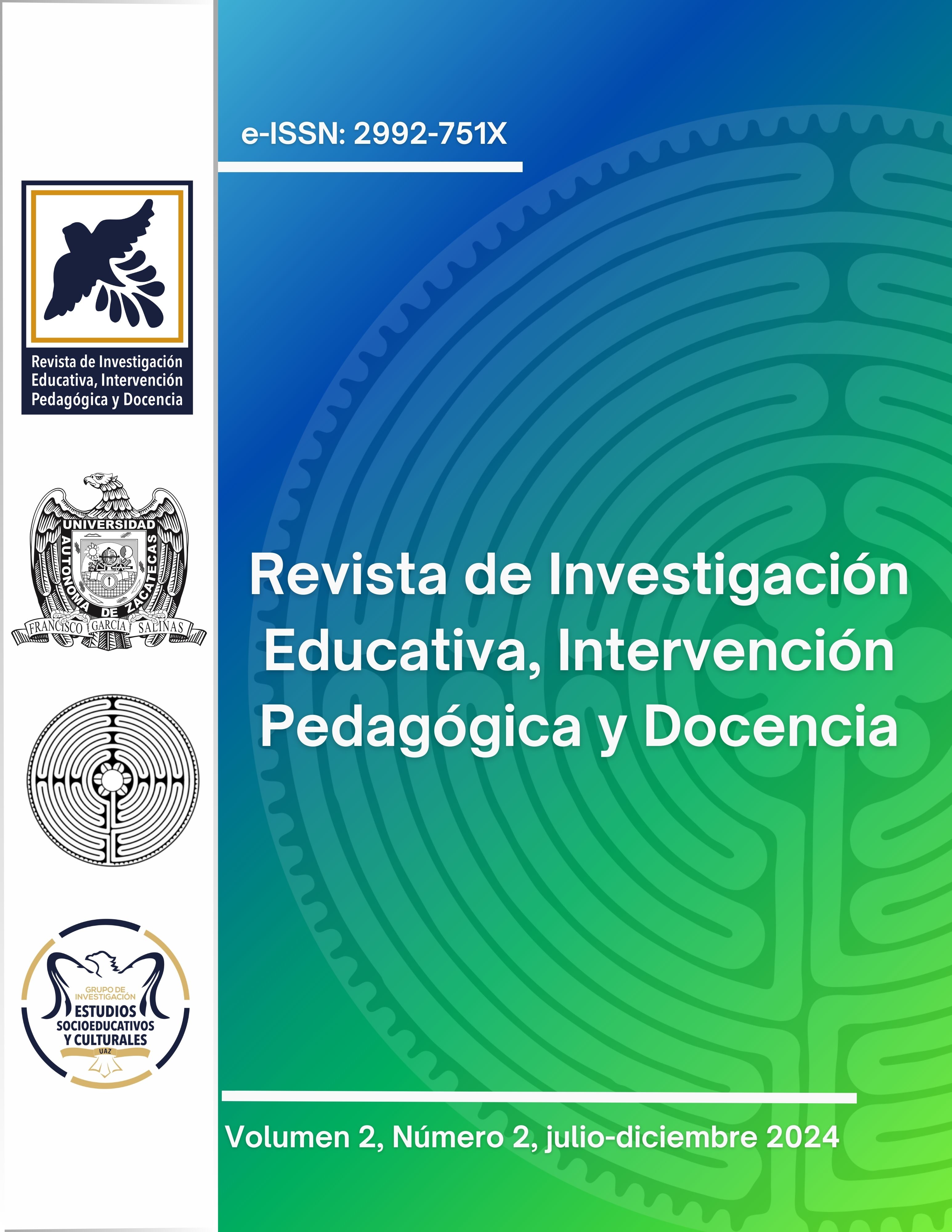Published 2024-07-05
Keywords
- ideas,
- summary,
- games based learning,
- estrategies
Copyright (c) 2024 Revista de Investigación Educativa, Intervención Pedagógica y Docencia

This work is licensed under a Creative Commons Attribution-NonCommercial-ShareAlike 4.0 International License.
How to Cite
Abstract
Reading comprehension is a skill developed from a process containing many factors. Therefore, this study
aimed to generate an educational intervention process to improve student's reading comprehension
through the meaning and function of main ideas, secondary ideas, summaries, and keywords. For this
reason, four purposes were proposed: 1) to identify previous knowledge, 2) to conduct an informative class,
3) to develop a practical activity, and 4) to identify the learning and progress obtained. For this purpose, a
qualitative study was carried out, with action research, developing instruments such as the questionnaire
and participant observation. The main results are: 1) there is a slight notion of the concepts, 2) there is
confusion between the conceptualizations of the terms 3) the intervention generated a high percentage of
assertiveness in the development of the activity. The research showed that the teacher's role and
commitment to student learning are fundamental to creating scenarios and tools that promote reading and
reading comprehension. Thus, there are several factors to consider to obtain this skill.
Downloads
References
- Akyol, H. y Çoban, Ü. (2021). Developing Reading, Reading Comprehension and Motivation: An Action Research Study. Egitim ve Bilim, 46(205), 69–92. https://doi.org/10.15390/EB.2020.8977
- Araya Muñoz, C. (2019). Estrategias de Comprensión para la Identificación de Ideas Principales y Secundarias: investigación- acción en Segundo año de Enseñanza Media [Tesis de pregrado]. Pontificia Universidad Católica de Valparaíso. http://opac.pucv.cl/pucv_txt/txt-9500/UCC9716_01.pdf
- Bancayán Ore, C. y Vega Denegri, P. (2020). La investigación-acción en el contexto educativo. Paideia XXI, 10(1), 233-247. https://doi.org/10.31381/paideia.v10i1.2999
- Bautista Cárdenas, N. (2021). Proceso de la Investigación Cualitativa. Epistemología, metodología y aplicaciones. Manual Moderno.
- Cisneros-Caicedo, A. J., Guevara-García, A., Urdánigo-Cedeño, J. y Garcés-Bravo, J. (2022). Técnicas e Instrumentos para la Recolección de Datos que apoyan a la Investigación Científica en tiempo de Pandemia. Domino de las Ciencias, 8(1), 1165-1185. DOI: http://dx.doi.org/10.23857/dc.v8i41.2546
- Cornellà, P., Estebanell, M., y Brusi, D. (2020). Gamificación y aprendizaje basado en juegos. Enseñanza de las Ciencias de la Tierra, 28(1), 5-19. https://raco.cat/index.php/ECT/article/view/372920.
- Dorantes, Nova, J., y Tobón, Tobón, S. (2017). Instrumentos de Evaluación: Rúbricas socioformativas. Praxis Investigativa ReDIE, 9(17), 79-86. http://www.praxisinvestigativa.mx/assets/praxisinv17.pdf#page=79
- Espinoza Freire, E. (2020). La investigación cualitativa, una herramienta ética en el ámbito pedagógico. Conrado, 16(75), 103-110. http://scielo.sld.cu/pdf/rc/v16n75/1990-8644-rc-16-75-103.pdf
- Gil Escolano, G., Ferriz Valero, A., García Jaén, M. y García Martínez, S. (2020). Impacto de la Teoría de la Autodeterminación en las Necesidades Psicológicas Básicas en Alumnado de Secundaria. Revista Kronos, 19(2). https://rua.ua.es/dspace/bitstream/10045/117142/1/Gil-Escolano_etal_2020_Kronos.pdf
- Gómez, López, L. y Silas, Casillas, J. (2012). Impacto de un Programa de Comprensión Lectora. Revista Latinoamericana de Estudios Educativos, 42(3), 35–63. https://www.redalyc.org/pdf/270/27024686003.pdf
- Gonzales Díaz, R., Acevedo Duque, A., Guanili Gómez, S. y Cruz Ayala, K. (2021). Ruta de Investigación Cualitativa–Naturalista: Una alternativa para estudios gerenciales. Revista de Ciencias Sociales, 27(4), 334-350. https://doi.org/10.31876/rcs.v27i.37011
- Loayza Maturrano, E. (2020). La investigación cualitativa en Ciencias Humanas y Educación. Criterios para elaborar artículos científicos. EDUCARE ET COMUNICARE Revista de investigación de la Facultad de Humanidades, 8(2), 56-66. https://doi.org/10.35383/educare.v8i2.536
- Noroozi, O., Dehghanzadeh, H. y Talaee, E. (2020). A systematic review on the impacts of game-based learning on argumentation skills. In Entertainment Computing, 35, 100369. https://doi.org/10.1016/j.entcom.2020.100369
- Peña Garcia, S. (2019). El Desafío de la Comprensión Lectora en la Educación Primaria. Panorama, 13(24), 43–56. https://doi.org/10.15765/pnrm.v13i24.1205
- Peronard, M. (1994). La Evaluación y comprensión de textos escritos: el problema del resumen. Lenguas Modernas, (21), 81–93. https://lenguasmodernas.uchile.cl/index.php/LM/article/view/45591/47654
- Reinoso Lastra, J. (2012). Implementation of a virtual learning environment oriented towards business training. Estudios Gerenciales, 28(122), 105–119. https://doi.org/10.1016/S0123-5923(12)70196-1
- Rocha, C., Rodrigues, B. y Araújo Neta, C. (2019). Estratégias de leitura e a compreensão leitora: uma pesquisa-ação realizada no Ensino Médio. Entrepalavras, 9(3), 342. https://doi.org/10.22168/2237-6321-31671
- Silvestre Estela, F. y Da Cunha, M. (2022). Modelo de cuestionario para el estudio de no-usuarios de bibliotecas. Usuarios de la información: estudios, métodos y comunidades sociales. Universidad Autónoma de México, 41-56. https://ru.iibi.unam.mx/jspui/bitstream/IIBI_UNAM/320/1/usuarios_info_estudios.pdf#page=42
- Soto, C., Gutiérrez de Blume, A., Carrasco Bernal, M. y Contreras Castro, M. (2020). The role of meta‐cognitive cues on the comprehension of proficient and poor readers. Journal of Research in Reading, 43(3), 272-289. https://doi.org/10.1111/1467-9817.12303


